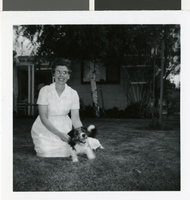Search the Special Collections and Archives Portal
Search Results
Millennium Youth Conference at UNLV: photographic prints, 2000 July 14
Level of Description
Item
Archival Collection
Dennis McBride Photograph Collection
To request this item in person:
Collection Number: PH-00263
Collection Name: Dennis McBride Photograph Collection
Box/Folder: Box 042
Collection Name: Dennis McBride Photograph Collection
Box/Folder: Box 042
Archival Component
AIDS Memorial Garden at UNLV: photographic prints, 2000 July 07
Level of Description
Item
Archival Collection
Dennis McBride Photograph Collection
To request this item in person:
Collection Number: PH-00263
Collection Name: Dennis McBride Photograph Collection
Box/Folder: Box 042
Collection Name: Dennis McBride Photograph Collection
Box/Folder: Box 042
Archival Component
Maintenance department orders, 1931 July 24 to 1931 November 18
Level of Description
File
Archival Collection
Howard Hughes Film Production Records
To request this item in person:
Collection Number: MS-01036
Collection Name: Howard Hughes Film Production Records
Box/Folder: Box 577 (Restrictions apply)
Collection Name: Howard Hughes Film Production Records
Box/Folder: Box 577 (Restrictions apply)
Archival Component
Casting sheets and cards, 1931 July 13 to 1932 January 12
Level of Description
File
Archival Collection
Howard Hughes Film Production Records
To request this item in person:
Collection Number: MS-01036
Collection Name: Howard Hughes Film Production Records
Box/Folder: Box 056 (Restrictions apply)
Collection Name: Howard Hughes Film Production Records
Box/Folder: Box 056 (Restrictions apply)
Archival Component
Dialogue continuities, RKO Radio Pictures release, 1949 July 11
Level of Description
File
Archival Collection
Howard Hughes Film Production Records
To request this item in person:
Collection Number: MS-01036
Collection Name: Howard Hughes Film Production Records
Box/Folder: Box 153 (Restrictions apply)
Collection Name: Howard Hughes Film Production Records
Box/Folder: Box 153 (Restrictions apply)
Archival Component
Southern Nevada Community Profile by Nevada Development Authority, 1984 July
Level of Description
File
Archival Collection
Clark County Planning Commission Research Library Collection
To request this item in person:
Collection Number: MS-01027
Collection Name: Clark County Planning Commission Research Library Collection
Box/Folder: Box 75
Collection Name: Clark County Planning Commission Research Library Collection
Box/Folder: Box 75
Archival Component
Exterior view of Rainbow Club and Eldorado: photographic negative, 1980 July
Level of Description
Item
Archival Collection
UNLV Libraries Single Item Accession Photograph Collection
To request this item in person:
Collection Number: PH-00171
Collection Name: UNLV Libraries Single Item Accession Photograph Collection
Box/Folder: Box SH-024
Collection Name: UNLV Libraries Single Item Accession Photograph Collection
Box/Folder: Box SH-024
Archival Component
Gaming Hearings. Contains memos and agendas, 1975 July to 1975 August
Level of Description
File
Archival Collection
Howard Cannon Papers
To request this item in person:
Collection Number: MS-00002
Collection Name: Howard Cannon Papers
Box/Folder: Box 01 (Misc.)
Collection Name: Howard Cannon Papers
Box/Folder: Box 01 (Misc.)
Archival Component
Gaming and Lodging Gaming Intelligence Reports, 2002 July to 2002 November
Level of Description
File
Archival Collection
UNLV Libraries Collection of Merrill Lynch & Bear Stearns Reports
To request this item in person:
Collection Number: MS-01060
Collection Name: UNLV Libraries Collection of Merrill Lynch & Bear Stearns Reports
Box/Folder: Box 15
Collection Name: UNLV Libraries Collection of Merrill Lynch & Bear Stearns Reports
Box/Folder: Box 15
Archival Component

Photograph of a woman and her dog, unknown location, circa July 1969
Date
1969
Description
Mom and Queenie could be Phylis (Ruhes) Kaiser.
Image
Pagination
Refine my results
Content Type
Creator or Contributor
Subject
Archival Collection
Digital Project
Resource Type
Year
Material Type
Place
Language
Records Classification
